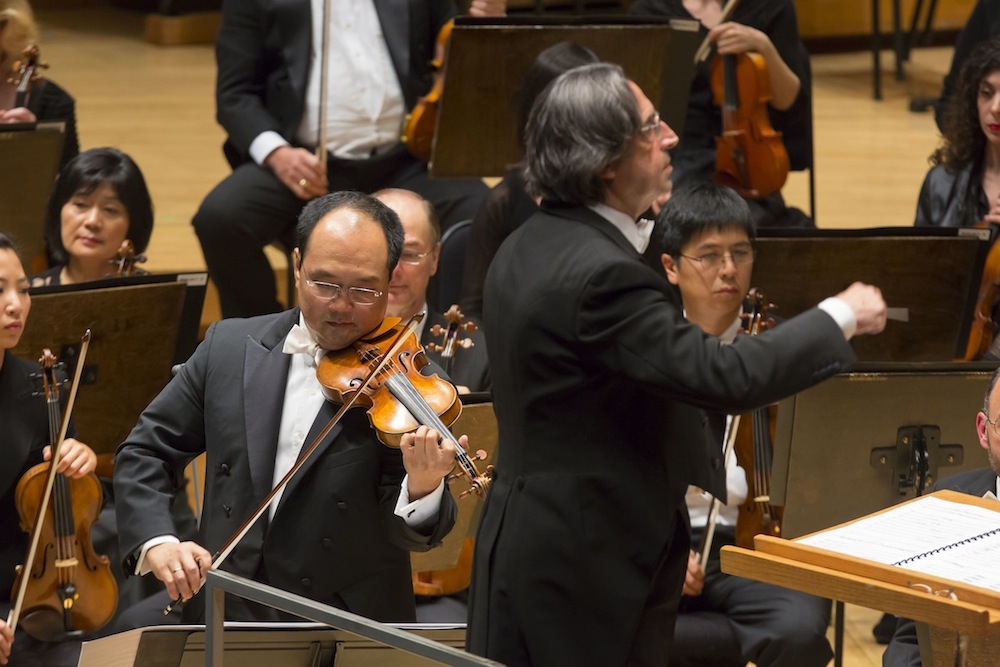Chen, Muti and CSO make a case for Hindemith’s Violin Concerto

Robert Chen performs Hindemith’s Violin Concerto with Riccardo Muti and the CSO Thursday night at Symphony Center. Photo: Todd Rosenberg
For many, the music of Paul Hindemith remains a kind of German spinach—it may be good for us, but doesn’t really taste all that great and we often have trouble forcing it down.
Hindemith’s Violin Concerto, heard Thursday night at Symphony Center performed by soloist Robert Chen with Riccardo Muti and the Chicago Symphony Orchestra, is emblematic of the composer’s style—well-crafted music with a searching lyricism wedded to a restless astringent tonality.
Despite fitful attractive moments and whipcrack scoring, Hindmith’s 1939 concerto is hobbled by the composer’s relentlessly unmemorable thematic material, and the same kind of overarching grayness that inhabits so much of Hindemith’s prolific output. The composer’s oft-quoted statement that music should be “useful” (Gebrauchsmusik or “utility music”) is all too apt for his brand of busily anonymous note-spinning that often seems like the musical equivalent of a handy kitchen appliance. One almost expects to read a fulsome endorsement by Betty Furness in the program.
While Hindemith’s music remains a tough sell, his Violin Concerto received supreme advocacy by soloist Chen Thursday with Muti and his CSO colleagues providing full-tilt support.
The solo part is almost without pause throughout the three movements and Robert Chen delivered a superbly finished performance. The CSO concertmaster brought a chaste, sweet tone to the reflective aria-like solos of the first two movements, with just a slight dash of vinegar to add asperity. Chen breezed through the bravura passages of the finale with characteristic unruffed elan, throwing off the challenges with near-faultless intonation and pinpoint articulation.
The concerto is scored for large orchestra, and Muti seemed intent on making a case for this score with as big and red-blooded an accompaniment as possible. In the would-be witty finale, Hindemith’s inscrutable humor is like the weirdo uncle at a family event who keeps repeating the same unfunny joke. The elephantine bombast of the chords and cataclysmic tuttis almost make the music–or Muti’s approach to it–seem like Hindemith is satirizing something we’re not aware of; one pictures the egg-craniumed composer mirthlessly capering about in heavy boots.
Prokofiev’s Romeo and Juliet has long been a Muti party piece with his superb EMI recording one of the finest discs to come out of his Philadelphia Orchestra tenure.
Still it’s a bit unsettling to have the CSO music director repeating repertory so soon in his Chicago tenure. Muti led the CSO in the same Prokofiev excerpts in 2011 and the Brahms Second Symphony, performed opening week, was heard just last year.
That said, Muti has a clear affinity for Prokofiev and the combination of lyrical warmth and orchestral bravura in the Russian composer’s Romeo and Juliet ballet music fits the Italian maestro as perfectly as his Armani suits.
The 48-minute Suite Muti has distilled from Romeo and Juliet makes an effective, programmatic quasi-symphony. With notably propulsive and elegant playing by the orchestra, the ballet’s sections were vividly characterized Thursday night. Nimble string playing painted the lightness of spirit in “Juliet as a Young Girl” and Muti drew out an apt, naive and affectionate warmth for the well-meaning “Friar Laurence.”
The “Death of Tybalt” went with vehement edgy violence and the delicacy of the playing in the music depicting the doomed lovers was touching and expressive, with Mathieu Dufour’s delicate flute work especially notable.
The evening led off with Mozart’s Divertimento in D major, K.136. Even in this short work by the 16-year-old Mozart, the craft and finish are inimitable. Muti led a graceful, energetic reading, the two-dozen CSO strings performing with a deft blend of expressive poise and Rococo elegance.
The program will be repeated 8 p.m. Saturday, 7:30 p.m. Tuesday and 1:30 p.m. October 11. cso.org; 312-294-3000.
Posted in Performances


